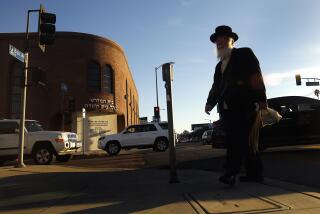Messianic Synagogue Draws Criticism From Some Jewish Leaders
- Share via
Synagogues in the growing area from Calabasas to Thousand Oaks are usually in a polite competition for new members before the High Holy Days. But this year the Conservative, Orthodox and Reform temples also have banded together in a united front against a newcomer--a Jewish congregation that believes in Jesus as the messiah.
Starting with Rosh Hashana eve services Wednesday, the Beth Emunah Messianic Synagogue, which has been leasing a church in Canoga Park, will be open for worship in Agoura Hills, in a rented industrial site.
The impending move--into an area where conventional synagogues and schools are struggling for footholds amid a rapidly expanding Jewish population--has set off a debate over whether religious tolerance or religious deception is the issue.
Messianic Rabbi Murray Silberling, as he identifies himself, conceded his ad in the Yellow Pages does not mention Jesus. But he said that telephone callers and visitors are informed quickly that his congregation regards “Yeshua,” Hebrew for Jesus, as the messiah.
Eventually, he said, they are told that Jesus is revered as divine, as part of the Christian Trinity.
So what is the difference between the messianic Jewish faith and Christianity?
There are differences, Silberling said, including his congregation’s adherence to Jewish rituals and customs. “We don’t consider ourselves Christians. We think we should be considered another stream of Judaism,” he said.
*
Local rabbis and the Jewish Federation’s Valley Alliance, however, say the messianic synagogue presents a misleading picture.
“Unfortunately, we have a lot of people who are not very literate in their own religion,” said the Valley Alliance’s Debra Laskow. “These people are extremely friendly but this is a misrepresentation of Judaism.”
Last month, rabbis at four synagogues--two Conservative, one Reform and one Hasidic Orthodox--signed a statement declaring that while devout Jews look for a messiah, or a messianic era, they believe that neither has arrived. An Orthodox rabbi and a Reform rabbi from Calabasas later added their signatures.
“While they may be well intentioned, leaders of Beth Emunah Synagogue create . . . confusion when they mix the rituals of our religion with the belief system of another,” the statement said. “Our concern is based on the fact that more problems are created than are solved with this admixture of Judaism and Christianity.”
Because many Jews marry non-Jews or do not practice the religion “the Jewish community is highly susceptible to the overtures of . . . those movements within evangelical Christianity that are dressed up as authentic Judaism,” Rabbi Benzion Kravitz told about 200 people attending a forum on the controversy at Temple Beth Haverim in Agoura Hills.
*
Kravitz disputed Silberling’s assertion that his messianic synagogue draws its practices and beliefs strictly from the Hebrew Bible and the Christian New Testament, and that messianic Jews ignore the Rabbinic interpretations in the Talmud that are vital to conventional Judaism.
“When they wear yarmulkes and light Shabbat candles, where does that come from?” asked Kravitz.
Silberling, who began the messianic congregation in 1992 after moving from the Seattle area, accused Kravitz’s Jews for Judaism of giving out misinformation. “When they decide to target a group they are vitriolic and unethical,” Silberling said.
The dispute is a common one that flares up intermittently in Jewish communities. Although Roman Catholic and most old-line Protestant churches decline to actively proselytize Jews, some theologically conservative churches back Jewish evangelism. Still other Hebrew-Christian and messianic Jewish congregations operate apart from denominational ties.
Silberling said he is on the executive committee of the Messianic Jewish Alliance of America, which he said was one of two major groups embracing about 400 messianic congregations worldwide.
He speculated that Beth Emunah’s five-year stay in Canoga Park drew no criticism because the established synagogues in the San Fernando Valley did not feel threatened.
But in the communities that straddle the Ventura Freeway and stretch across the Los Angeles-Ventura county line into the Conejo Valley, some conventional Jewish congregations are still getting established.
Both sides of the controversy, however, have cited the educational opportunities presented.
Rather than being hurt by the dispute, Silberling said that Beth Emunah Messianic Synagogue has been receiving “five to six calls a day from people who want to come to our services,” including couples in which one spouse is Jewish and the other Christian.
More to Read
Sign up for Essential California
The most important California stories and recommendations in your inbox every morning.
You may occasionally receive promotional content from the Los Angeles Times.













